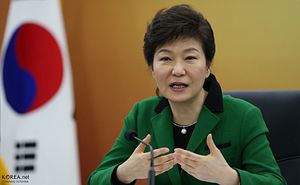In a speech on Tuesday, November 29, South Korean President Park Geun-hye announced her intent to step away from the presidency, provided the contours of her resignation are determined and sanctioned by the South Korean National Assembly. In particular, she emphasized the need for the Assembly to ensure a stable transition of power.
Park’s decision to start the process of leaving office, without resigning immediately, comes after weeks of popular protests over an influence-peddling scandal involving a close personal confidante, Choi Soon-sil. (More background on the specifics of what launched the scandal here.)
“I will leave everything including my own term to the legislature’s decision,” Park said in her remarks, according to the Korea Herald.
While Park did not deliver her resignation immediately, she said wanted the South Korean National Assembly to pass legislation to truncate her term. South Korea is scheduled for its next presidential election in December 2017, with the next president slated to take office in February 2018.
According to Article 71 of the South Korean constitution, which outlines an order of succession in the event the president is “not being able to discharge the duties of his/her office,” the prime minister would be first in line. Hwang Kyo-ahn is the current prime minister, occupying a role similar to that of a vice president in other presidential systems of government.
However, in the case Park resigns or is impeached, new presidential elections would take place within 60 days, putting pressure on South Korea’s political parties.
Amid the scandal, which erupted in October, Park’s approval rating had plummeted to 4 percent, with 80 percent of South Koreans supporting her impeachment in a recent poll. The “Choi-gate” scandal drove South Korean protesters out in record numbers over five consecutive weekends of protests in the capital of Seoul.
Choi Soon-sil was officially charged by South Korean prosecutors for intervening in affairs of state and coercing South Korean conglomerates into funding her foundations and businesses. Prosecutors have also said that they believe Park may have conspired with Choi in criminal activities, but Article 84 of the South Korean constitution confers immunity on the president, which has so far prevented Park from being indicted.
Park’s proposal of what appears to be a conditional resignation may be contingent on her preserving immunity from prosecution after stepping away from power.
Finally, South Korea’s opposition parties may resolve to move ahead with an impeachment motion against Park after the speech. The earliest the National Assembly could vote on either impeachment or truncating Park’s term would be Friday, December 2. However, impeachment would be subject to review by the Constitutional Court, a process which can take months.
Listen to a recent podcast here at The Diplomat, featuring SinoNK’s Steven Denney on the domestic political factors driving the ‘Choi-gate’ scandal in South Korea.

































